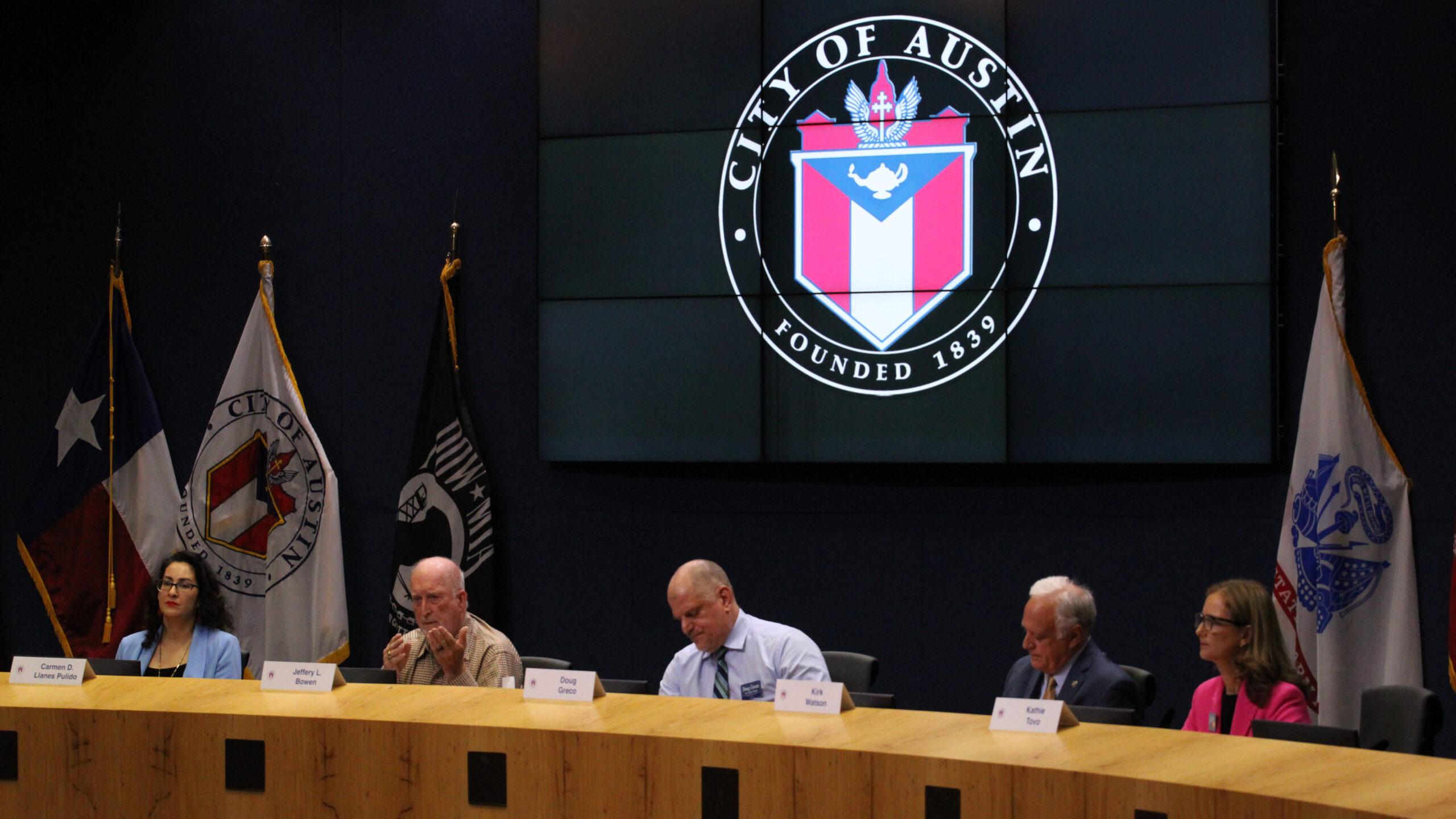 Candidates running for Austin mayor answer questions at a forum hosted at Austin City Hall Oct. 3. (Left to Right) Carmen Llanes Pulido, Jeffery Bowen, Doug Greco, Kirk Watson and Kathie Tovo each laid out policy stances at the event moderated and organized by the League of Women Voters. Justin Doud/TSTV News
Candidates running for Austin mayor answer questions at a forum hosted at Austin City Hall Oct. 3. (Left to Right) Carmen Llanes Pulido, Jeffery Bowen, Doug Greco, Kirk Watson and Kathie Tovo each laid out policy stances at the event moderated and organized by the League of Women Voters. Justin Doud/TSTV News
Just four days before early voting begins in Texas, candidates for Austin mayor faced off Thursday in their only scheduled debate of the cycle.
While more than two dozen forums and other opportunities for candidates to answer community questions have been held, according to candidate Kathie Tovo, this was one of only a handful to have hosted all five candidates.
The discussion was hosted by KXAN and moderated by anchors Jennifer Sanders and Tom Miller, with live fact-checking by reporter Grace Reader and KXAN Live anchor Esme Zamora.
The candidates present included Jeffery Bowen, Doug Greco, Carmen Llanes-Pulido, Kathie Tovo and incumbent mayor Kirk Watson. They were each questioned on policy points ranging from homelessness to affordability.
TSTV News summarized the candidate’s experience and policy stances highlighted during Thursday’s debate.
Jeffery Bowen
Bowen is the mayoral race’s outlier, never previously having run for office. He retired from the United States Air Force in 1996 after 20 years of service, and now owns a construction business in Austin. Central tenets of his campaign include a need to thoroughly audit the city and reallocate funding accordingly.
When asked about his role in a lawsuit against the city of Austin that undid CodeNext, meant to increase housing supply, Bowen said the lawsuit was in response to a violation of his rights by the city. If elected, he said he would fight for the rights of Austinites in an effort to prevent their being silenced.
When transportation was brought up, specifically the development of light-rail for Project Connect, Bowen pointed out his role as an ambassador for the project. He said he would push forward with the expansion of the bus routes and pick-up program, but that the project’s initial goals would likely not be accomplished.
“I would look at what they were trying to bring about and go, ‘you can’t build this for what you’re talking about. There’s just no way,’” Bowen said. “You’re not going to get it back to the almost 30 miles they were talking about … we need to push forward with the pickup program that’s already (served) over a million people.”
In relation to policing and the proposed contract for APD, Bowen said he would address officers’ concerns around mental health calls, and proposed continued implementation of Mental Health response units.
If the contract relieves staffing shortages as proposed, Bowen would increase law enforcement presence in areas with a high volume of mental health calls. He also pushed for added community involvement and a decrease in “toxicity.”
Bowen was also asked for specifics on plans regarding homelessness in Austin alluded to on his website. He said the city needs to analyze “what’s working and what’s not” in order to effectively combat the crisis.
When asked by TSTV News about plans to ease affordability for students in Austin, Bowen pointed to underlying issues as a source of the problem, indicating changes needing to be made didn’t reside within the jurisdiction of the mayor’s office.
Doug Greco
Greco’s political history includes serving as chief of staff to State Rep. Gina Hinojosa and director of operations for Equality California, an LGBTQ civil rights organization. He was the lead organizer for Central Texas Interfaith, and, before organizing, worked as a public high school teacher in Austin ISD for five years. Greco advocates for the eradication of large-scale tax breaks for corporations and for equity-based initiatives.
Greco recognized Austin’s growth both as a city and as a home for millionaires, while also pointing out the city’s decreasing number of Black and Latino residents and growing income inequality. He advocated for investment in affordable housing, rent and mortgage assistance, housing for the homeless and the need to limit institutional investors’ role in Austin’s housing market.
Greco said he’d ensure Project Connect is implemented on-time and on-budget, but would dedicate a higher portion of the funding to construction. This doesn’t directly fall under the mayor’s areas of oversight, and Greco did not provide clarification on how he would accomplish those goals. Greco added that wages for city bus drivers need to be increased seeing as their routes would be expanded under the project.
Greco also called for a pay increase for Austin police officers, as well as the need to invest in community policing and race-equity training. He emphasized the need for a contract with a budget that allows for continued community investments and that fully implements the Austin Police Oversight Act, which requires the unsealing of officers’ complaint records.
Greco was asked to specify how the city could improve overnight and emergency shelters to combat homelessness. He pointed to his work with organizations like Interfaith, recommending the city invest in these shelters as a gateway into permanent housing for those that utilize them.
“We need to make sure that we follow that community based approach for permanent housing, for overnight shelters and community housing,” Greco said.
TSTV News asked Greco about affordability for students in Austin, which he responded to by supporting affordable housing investment for students and the implementation of further updates to the land code.
Carmen Llanes Pulido
Llanes Pulido was previously an Austin city commissioner, an organizer in youth wellness and health and as an environmental advocate. She frequently promotes more affordable and sustainable energy practices, wage reform and the combatting of the city’s animal shelter crisis, among other issues.
Llanes Pulido acknowledged the wide-spanning range of people affected by Austin’s housing crisis. She pointed to public service workers as a group heavily affected by Austin’s high prices, and blamed the land-use code that existed prior to recent changes as a major contributor.
When questioned on Project Connect, Llanes Pulido pointed to her experience as a commissioner as an indicator of her preparedness to lead the city’s transportation needs. She said she would fulfill the contract’s guarantee to provide city-wide transit, benefitting essential workers and relieving traffic congestion, goals she says the current plan will not meet. She claimed the project’s current management is illegal per a lawsuit over property taxes used to fund the initiative, and pointed to on-demand and bus rapid transit as potential alternatives that could lead to rail implementation in the future.
Asked about public safety, Llanes Pulido proposed what she calls a holistic approach, targeting all areas that influence public safety beyond just policing. She said police vacancies come from a variety of sources besides funding issues including department culture, accountability and retention. Llanes Pulido said staff increases proposed in the police contract would not account for other emergency service needs like Austin Fire, Emergency Medical Services and social workers responding to emergency calls.
“I talk to people all over Austin who really want the same thing: a responsible, fast, accountable and prepared response to 9-1-1,” Llanes Pulido said.
Llanes Pulido was questioned on her criticism of The Marshalling Yard, an emergency homeless shelter with nearly $10 million of city funding that has housed over 1,000 individuals. She said she would listen to community groups with experience addressing homelessness, which advocated against the shelter before its inception. Llanes Pulido claimed the shelter serves to enforce sweeps of homeless communities, and that the city should stop incentivizing the demolition of affordable properties for new construction.
When asked by TSTV News about her plans to ease affordability for students, Llanes Pulido promoted the preservation of existing units and the construction of mixed low-income housing. She said that without guardrails, as is currently the state, updates to the land-use code have left students out of positive change.
Kathie Tovo
Previously an Austin city council member from 2011-2023 and mayor pro tempore from 2015-2019, Tovo has led initiatives in Austin around extreme weather events, sobriety diversion programs, childcare investment and more.
Tovo responded to questions regarding her involvement crafting the city’s affordable housing blueprint by pointing to Austin’s additions to housing in recent years. She also acknowledged the effects of rising costs on families and residents. Tovo cited utility cost reform and transportation improvements as possible solutions.
Tovo reiterated support for Project Connect and encouraged planning to extend the rail line’s reach as far as possible. She also encouraged continued investment in city bus lines and in wage improvements for city bus staff.
“I certainly would make sure that we are getting as much value as possible,” Tovo said. “And (I’d ensure) that we’re looking for opportunities to fund other segments of it through federal funding.”
When asked about 2020 support for paused police academy classes and the reallocation of academy funds, Tovo defended the need to address systemic issues in the academy. She reiterated her desire to build trust with the police and her involvement with the department in the past, but pointed to diversion programs and mental health response as important alternative tools.
On homelessness, Tovo pointed to the need to support shelters and permanent housing as well as programs targeting vulnerable individuals before they become homeless. She said that as mayor, she would champion the piece of the federal funding provision that called for private entities to match funds allotted to address homelessness.
TSTV News followed up with Tovo on plans to increase affordability for students, where she encouraged city partnership with universities to construct on-campus housing as a low-cost option. Tovo added the plan would free up space in surrounding communities for Austinites to move into, providing additional housing in a hotly-desired area.
Kirk Watson
Incumbent Mayor Watson previously served as mayor from 1997-2001 before being elected again in 2022. Between mayoral terms, Watson served 13 years in the Texas senate. During the debate, he frequently highlighted what he says are improvements to affordability and infrastructure under his administration, looking to continue that work and more if reelected.
When asked about steps taken to improve affordability, Watson said prior to his election as mayor, the city was stagnant. He emphasized changes to the land-development code and the development services department that now make it easier to attain permits, as well as the creation of the Austin Infrastructure Academy with the goal of job creation.
“We made affordability the first priority of this city,” Watson said. “We have instituted changes that people did not think we were ever going to see.”
Regarding Project Connect, Watson insisted the city continue what he said was a transparent planning process. He pointed to past advocacy for voters’ will against the statehouse’s opposition to the project, as well as his role in encouraging the federal government to finance portions of the project in collaboration with the Austin airport’s expansion.
On the proposed police contract’s filling of department vacancies, Watson supported the five-year contract period and increased pay as incentives to retain officers. He pointed to the contract as a sign of stability for the department.
Addressing homelessness, Watson said he inherited a broken system, which Tovo disputed, before pointing out his administration’s role investing in all aspects of the crisis. He defended the imposed camping ban by labeling emergency shelters as introduction points for individuals to Austin’s homelessness response system, which the ban encourages utilization of.
When asked by TSTV News about plans to increase affordability for students, Watson highlighted his work in collaboration with the university to increase availability, citing his desire to continue that partnership, though no specifics about what that work was were given.
Early voting lasts from Monday, Oct. 21 to Friday, Nov. 1. Election day is Tuesday, Nov. 5.
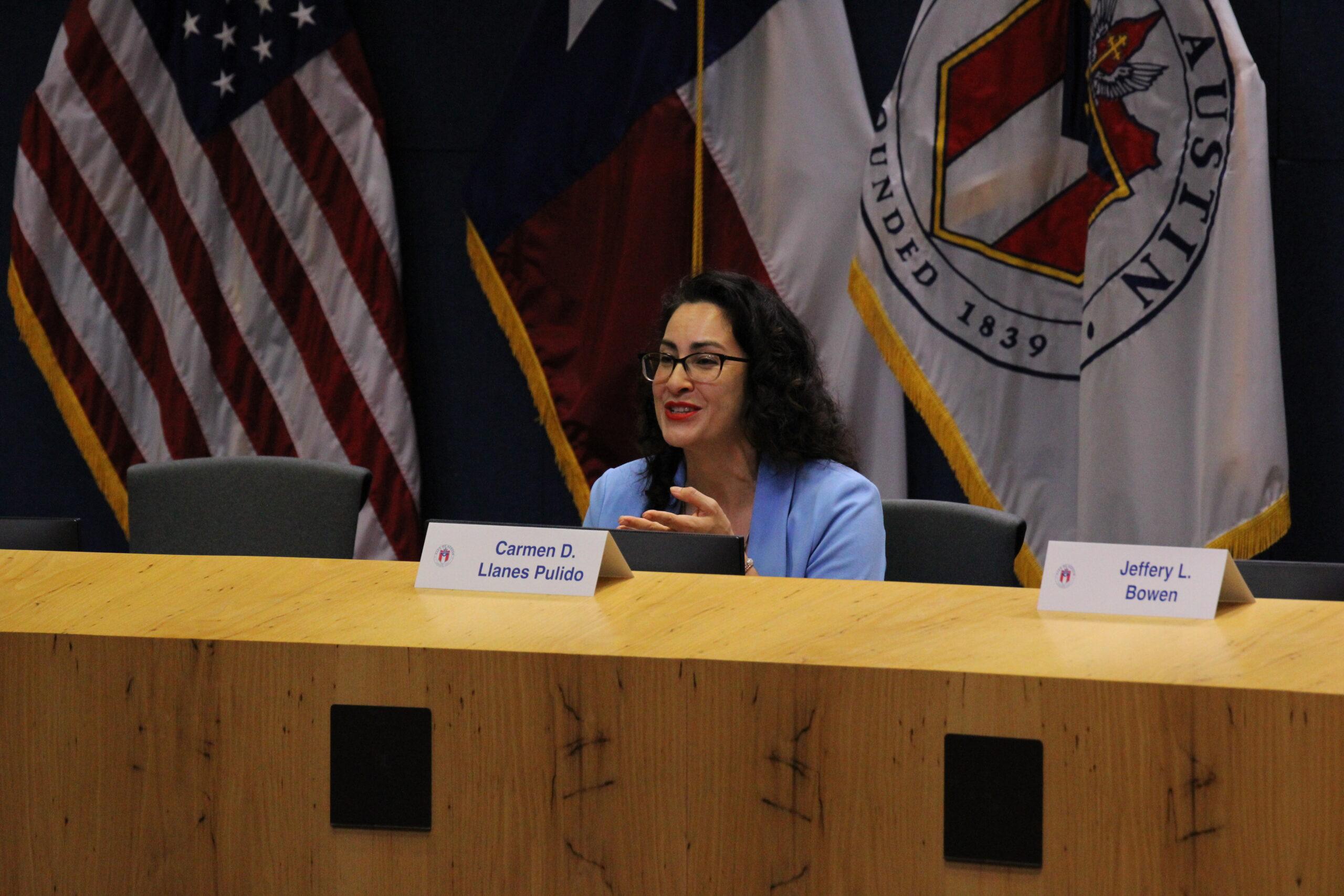 Candidate for Austin mayor Carmen Llanes Pulido responds to a question asked at a forum held by the League of Women Voters at Austin City Hall Oct. 3. Justin Doud/TSTV News
Candidate for Austin mayor Carmen Llanes Pulido responds to a question asked at a forum held by the League of Women Voters at Austin City Hall Oct. 3. Justin Doud/TSTV News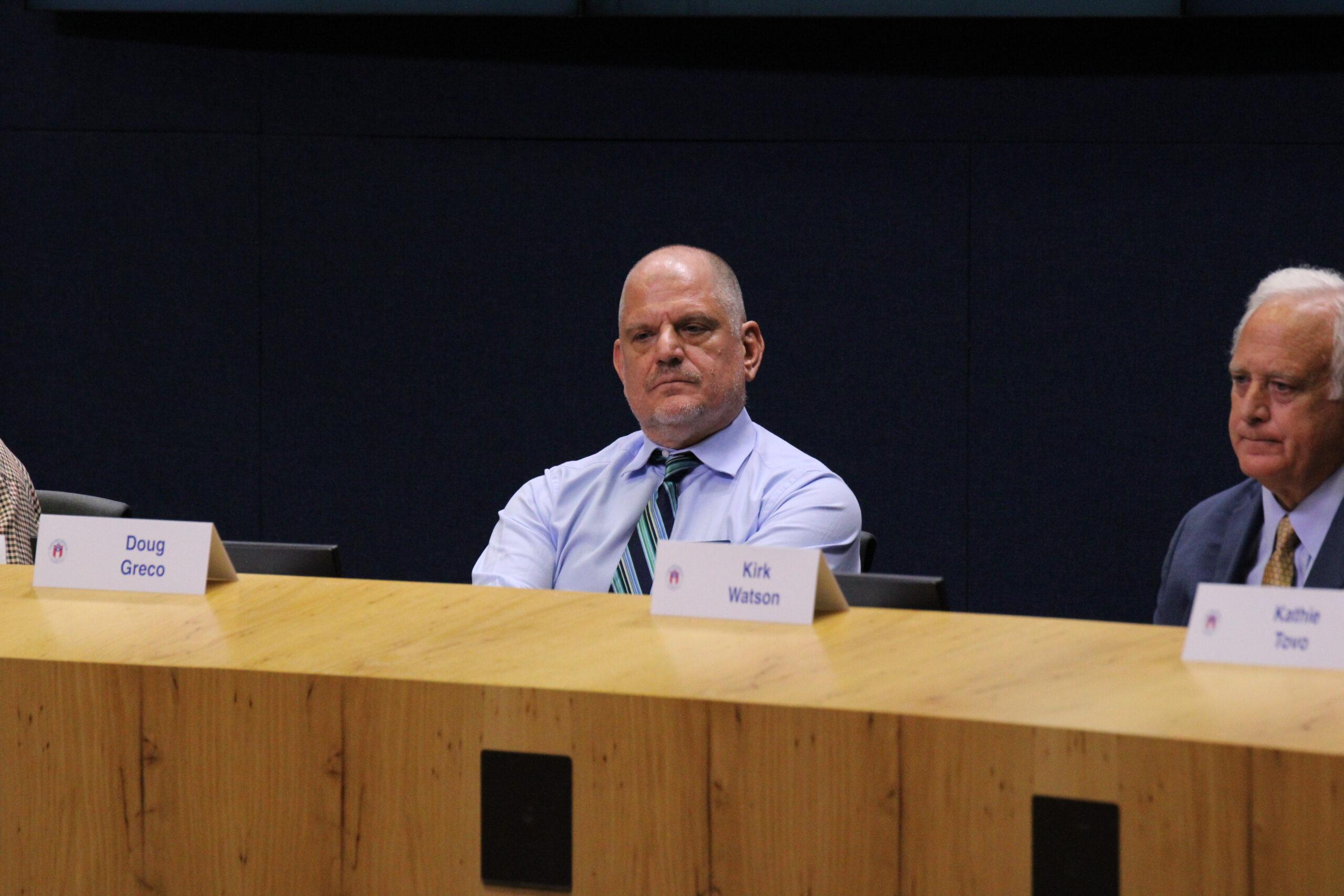 Candidate for Austin mayor Doug Greco listens to a moderator at a forum held by the League of Women Voters at Austin City Hall Oct. 3. Justin Doud/TSTV News
Candidate for Austin mayor Doug Greco listens to a moderator at a forum held by the League of Women Voters at Austin City Hall Oct. 3. Justin Doud/TSTV News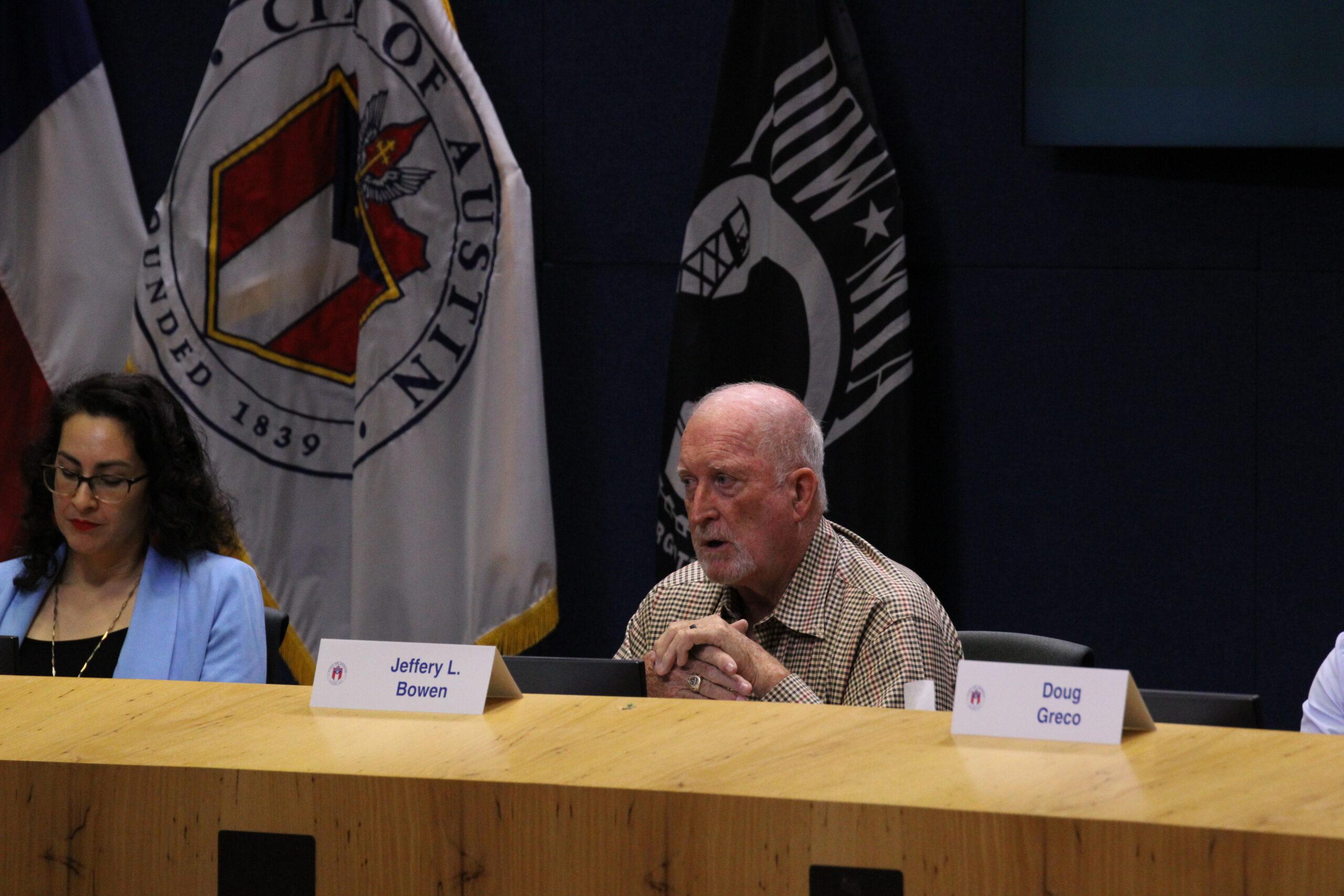 Candidate for Austin mayor Jeffery Bowen responds to a question asked at a forum held by the League of Women Voters at Austin City Hall Oct. 3. Justin Doud/TSTV News
Candidate for Austin mayor Jeffery Bowen responds to a question asked at a forum held by the League of Women Voters at Austin City Hall Oct. 3. Justin Doud/TSTV News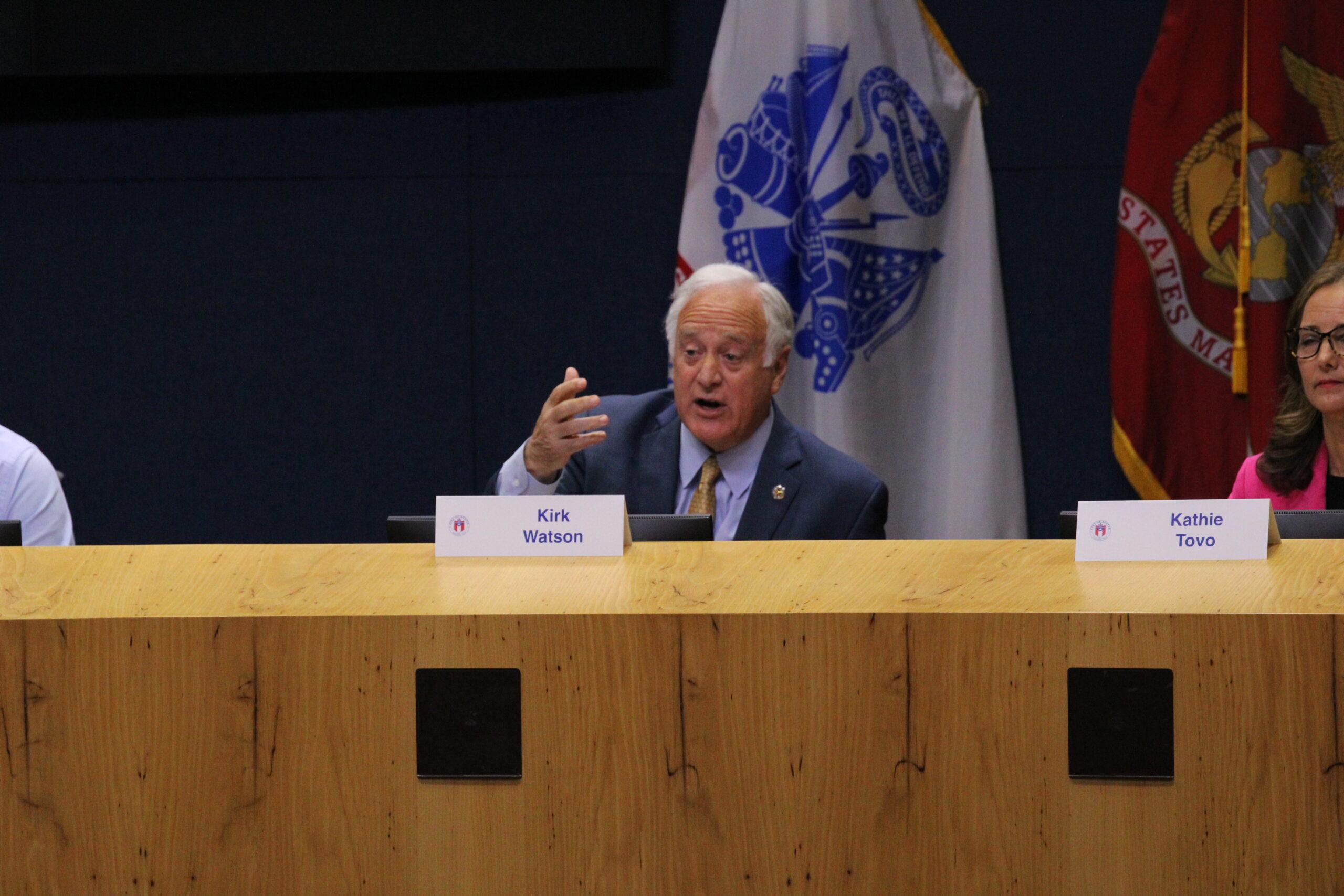 Incumbent mayor Kirk Watson responds to a question asked at a forum for Austin mayoral candidates held by the League of Women Voters at Austin City Hall Oct. 3. Justin Doud/TSTV News
Incumbent mayor Kirk Watson responds to a question asked at a forum for Austin mayoral candidates held by the League of Women Voters at Austin City Hall Oct. 3. Justin Doud/TSTV News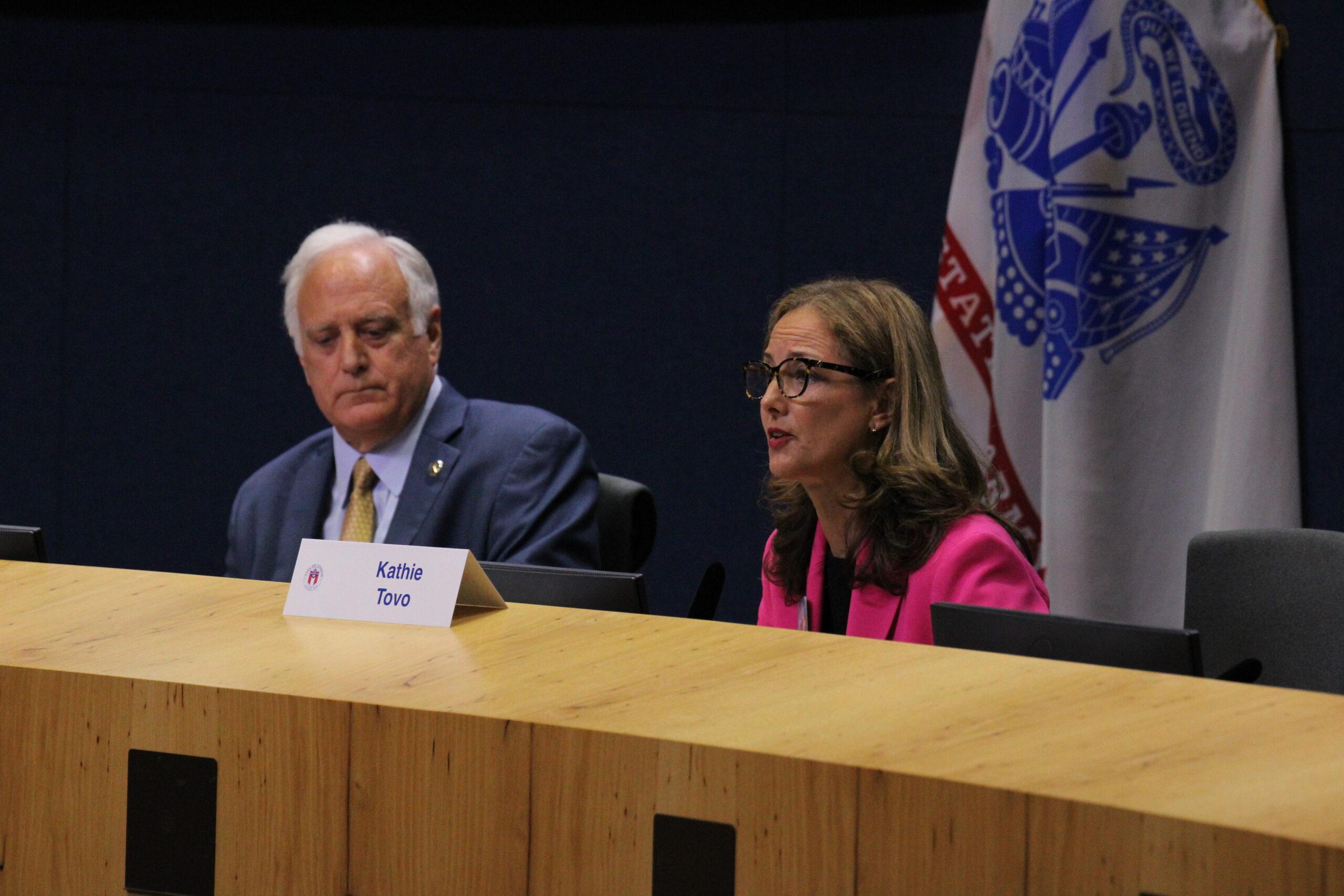 Candidate for Austin mayor Kathie Tovo responds to a question asked at a forum held by the League of Women Voters at Austin City Hall Oct. 3. Justin Doud/TSTV News
Candidate for Austin mayor Kathie Tovo responds to a question asked at a forum held by the League of Women Voters at Austin City Hall Oct. 3. Justin Doud/TSTV News